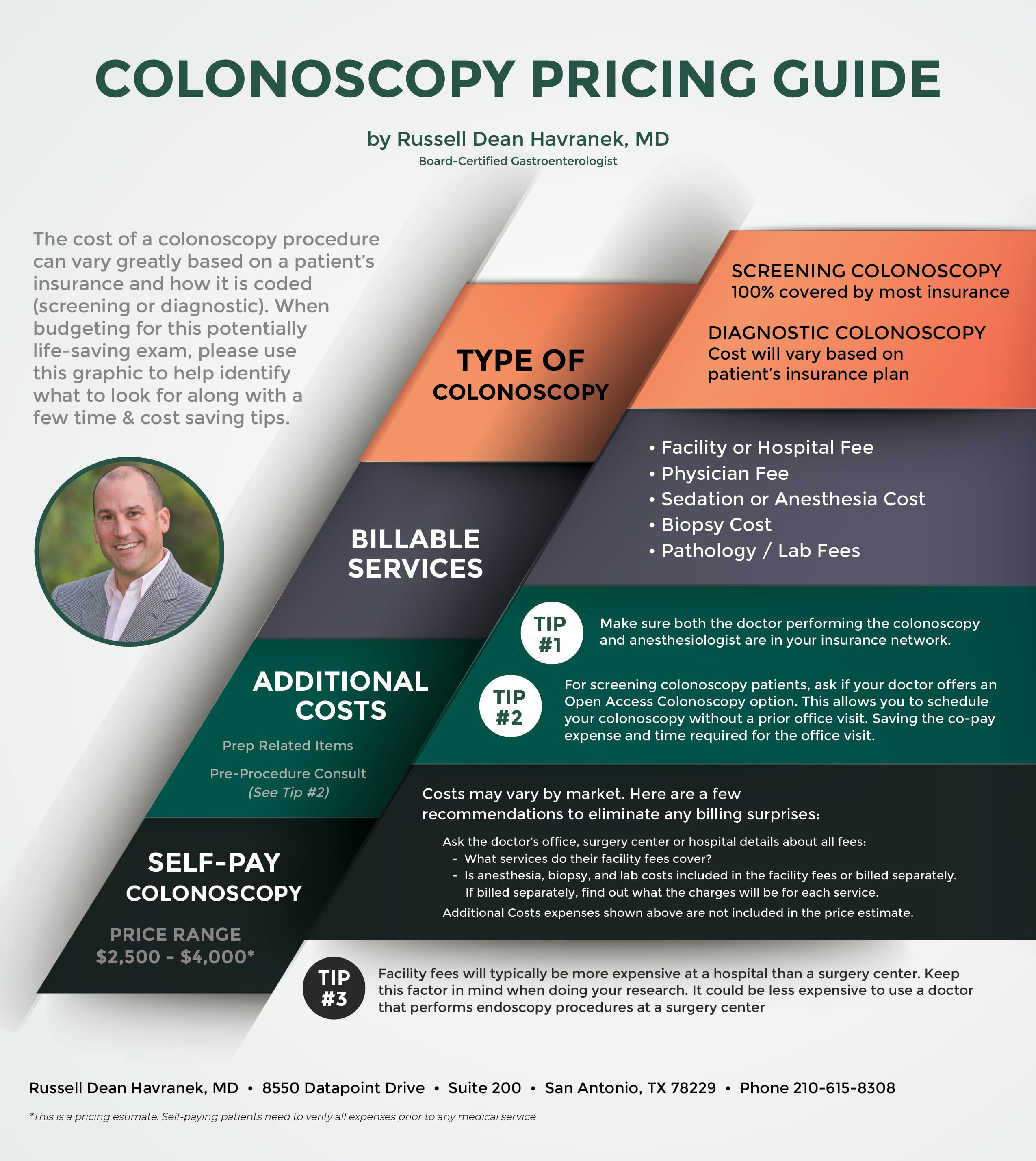Whether it’s time for your colon cancer screening exam or a symptom needs to be evaluated, we all will need to plan for a colonoscopy at some time in our life.
This process involves more than just the dreaded pre-exam prep solution. Like with all medical services, we need to plan for the related expenses to avoid any surprises.
To help with this budgeting process, I’ve created an infographic highlighting key aspects determining the patient’s financial responsibility. After the graphic, you’ll find a detailed description of the different potential fees that can be associated with your colonoscopy, along with a few tips as well.
In San Antonio, TX, we’re fortunate to have great healthcare options. I hope that this information better prepares patients as they select their colonoscopy doctor and equips them with the knowledge needed to ask the right questions.
Colonoscopy Types
All medical services are recorded with current procedural training or CPT code maintained by the American Medical Association. CPT codes tell the insurance company the exact services the doctor is performing. Colonoscopies are coded as either a screening or diagnostic exam.
Relative to billing, how your colonoscopy is coded will significantly affect the patient’s financial responsibility.
- A screening colonoscopy is for those over the age of 50 with no symptoms (either past or present) and without a personal or family history of gastrointestinal disease, colon polyps, or cancer. Insurance will typically cover a screening exam cost once every ten years, beginning at age 50.
- A colonoscopy is classified as diagnostic if the patient has a past or present history of gastrointestinal symptoms or disease, polyps, or cancer.
Prior to your colonoscopy, clarify with your doctor’s office whether your exam will be coded as screening or diagnostic. Then contact your insurance provider to confirm that the CPT code is accurate to avoid any errors/surprises.
Billable Services
To help understand the possible fees of a colonoscopy listed in the graphic, we’ll provide a brief description of each. The purpose of doing so is not to overwhelm the patient. Instead, it is just to educate them on what each charge represents.
Facility or Hospital Fee
The most considerable expense of a colonoscopy is the facility fee, representing the cost of the procedural location. This fee is for the equipment, supplies, and some of the staff. The doctor and medical professional administering anesthesia (anesthesiologist/CRNAs) are not included as part of the team within the facility fee.
Did you know… Surgery centers offer more competitive facility fees than a hospital. Therefore, having your colonoscopy at a surgery center will lower the total cost of the procedure.
Physician Fee
This is the fee charged by the physician performing the colonoscopy.
Sedation or Anesthesia Cost
A fee is charged to administer anesthesia during the procedure. It can be performed by an anesthesiologist or by a Certified Registered Nurse Anesthetists (CRNAs). Surgery centers typically use CRNAs to administer anesthesia during endoscopy procedures. Whereas a hospital will commonly employ an anesthesiologist for endoscopy procedures using anesthesia.
The fee for a CRNAs will be less than an anesthesiologist, so patients should confirm which will be used during their colonoscopy. Also, if an anesthesiologist is used, ensure that doctor is in your insurance network as well.
Biopsy Cost
If a small polyp is found during the exam, the doctor will remove it and take a biopsy. A larger polyp or tumor will be biopsied. The biopsies are sent to a lab to test whether they are cancerous.
The San Antonio Endoscopy Center includes taking the biopsy as part of their facility fee. Analyzing the biopsy will be billed by the pathology lab.
Pathology / Lab Fees
If a polyp is removed or biopsy is taken, that tissue is sent to the pathology lab for evaluation by a certified pathologist. The fee for this service is billed to the patient’s insurance company by the pathologist, and the patient’s out of pocket responsibility will be determined by their insurance plan.
Additional Costs:
Prep Related Items
The day before your colonoscopy, the patient will take a liquid prep that will clean out their colon. Also, patients will need to be on a clear liquid diet. Your doctor will provide instructions for both.
The cost of the prep liquid will depend on the patient’s insurance policy relative to medications. Items for the clear liquid diet (e.g., broth, Gatorade) are everyday items found in the grocery store.
If the patient’s insurance company does not cover the prep’s cost, we have a low-cost option available in our office called EZ2GO Bowel Prep. In my opinion, I think it is the best tasting prep option (I have drunk several of them). Inquire about this option at the time of scheduling, and we can mail it to you.
Pre-Procedure Consult
Cost of an office visit before the colonoscopy. This visit allows the doctor to assess a patient’s general health, along with any potential risks. Also, it provides patients with an opportunity to get answers to any questions they might have.
Save time and co-pay expense… Dr. Havranek does offer qualifying health patients getting a screening or diagnostic exam the option of an Open Access Colonoscopy. This option does not require an office visit before the exam.
Summary
Hopefully, this article has helped clarify what each cost related to a colonoscopy procedure represents. Understanding these fees should equip patients with the knowledge to ask the correct questions and accurately verify their insurance coverage before their exam.
Don’t feel overwhelmed. Typically, the majority of these costs are covered by your insurance company. If you have specific questions about your deductible or potential out of pocket expenses, my business office will cover the details with you when you schedule the colonoscopy.
Putting the monetary aspects of this medical service aside, please take the procedural prep seriously. Doing a good job with the prep allows your doctor to clearly see your colon and find any polyps should they exist.
Dr. Russell Havranek is a gastroenterologist in San Antonio, TX, and has performed thousands of successful colonoscopy procedures. If you are in need of a colonoscopy doctor, you can schedule an appointment online or call our office at (210) 615-8308.




